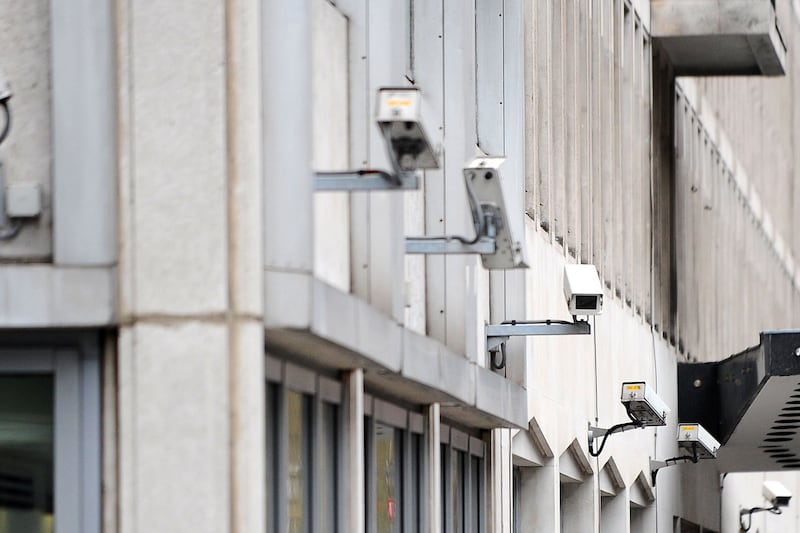There needs to be an “open and public debate” about the use of data-driven technology in policing in Northern Ireland, a new report has recommended.
The Policing Board also said there appears to be an “absence of significant consultation” by the PSNI, the Department of Justice and the Northern Ireland Office on issues where policing impacts upon people’s right to privacy.
The board’s Human Rights Review of Privacy and Policing also warned that the “absence of our democratic leaders watching the watchers may lead to a ‘surveillance state’ creeping up on us”.
The newly published review, the first of its kind in Northern Ireland, aims to highlight the importance of the right to privacy and its continued significance as policing and surveillance technologies become more and more sophisticated.
The report looks at the PSNI’s use of surveillance equipment, listening devices, informants and surveillance of social media and the websites that people visit.
It also examines police databases and the collection, retention, sharing and access to data about a person, including fingerprints, DNA profiles and facial images.
It stated: “This report is also concerned with what appears to be an absence of significant consultation by the police, the Department of Justice, or the Northern Ireland Office on issues of privacy.
“The driver for new facial recognition systems, biometric data retention, CCTV and ANPR (automatic number plate recognition) is the Home Office and the College of Policing, which are often adopted in Northern Ireland without any public consultation.
“Transparency in policing is difficult when techniques of targeted surveillance are concerned.
“Nevertheless, what techniques are actually used by PSNI in secret is often exaggerated and distorted.
“However, it is precisely these factors which continue to undermine confidence in PSNI, especially in some communities.
“A service which would wish the public to believe that it is solidly built on the basis of ‘policing by consent’ must continue to strive to become more transparent as these techniques have greater and greater impacts on privacy.”
The main recommendation from the report is that there should be “open and public debate about data-driven technology in policing, including developments in and use of artificial intelligence and algorithms, biometrics, digital forensics, surveillance, and investigatory powers”.
It said: “PSNI should aim to become an organisation driven by effective and efficient use of data in an ethical way.
“The ethical use of data is about responsible and trustworthy use of data to ensure public trust and confidence rather than constraining its potential.”

It said the PSNI and the Policing Board should agree on a Memorandum of Understanding to ensure early visibility and oversight of any new strategy, policy or practice under consideration.
The review also called for the PSNI to set out its current use and future proposals on facial recognition systems in a special report to the board.
The report said that currently the PSNI can access databases with 18.5 million people’s records, 58.5 million driver records, and 62.6 million vehicle records.
Additionally, Northern Ireland has several traffic cameras – 234 active sites, 109 of which are permanent.
It said there is also the possibility of live time access to seek matches with the 18.5 million facial images on the Police National Database (PND) in the UK.
The report said: “Police surveillance can often be an emotive and exciting topic but this often results in people either overestimating the extent of being ‘spied on’ all the time or alternatively assuming that all police surveillance is minimal and justified.
“Not surprisingly the actual position is more complex and, unfortunately, the absence of our democratic leaders watching the watchers may lead to a ‘surveillance state’ creeping up on us.
“It’s important to ensure openness and transparency save where there is a genuine and compelling reason not to be transparent, and that the line between the two is drawn in the right place.”
It continued: “PSNI have not engaged in some of the more intrusive practices favoured by some other police services, but this report highlights the need for continued scrutiny and debate.
“There has been little public debate or discussion around facial recognition or other biometric surveillance techniques in Northern Ireland.”

Assistant Chief Constable Chris Todd said the PSNI welcomed the report.
He said: “Much of the work done by police to investigate crime and keep people safe impacts, by necessity, on individuals’ right to privacy.
“This is a matter which we take extremely seriously and human rights remain the cornerstone of our policing approach.
“As this report makes clear, there are opportunities and challenges in police use of data and new technology and it is crucial the public have confidence in our ability to do so ethically.
“Police service activity which infringes on the right to privacy is rightly subject to significant external scrutiny and accountability.
“This is crucial to maintaining public confidence.”
He added: “We will continue to work closely with the Northern Ireland Policing Board to further improve confidence and transparency in this crucial area.”








